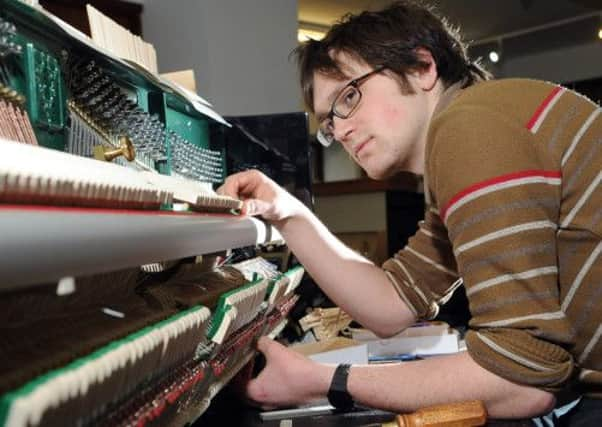Why pianos still play a key role


Some would argue the statistics speak for themselves.
Today around 4,000 acoustic pianos are sold in Britain each year. In the late 1960s, the figure hovered around 14,000. In the 1920s pretty much every town and city boasted if not its own piano manufacturer then a dozen or so tuners. At the last count there were just three manufacturers in the whole of the country and just a handful still skilled in the art of perfect pitch.
The days when a piano was considered as much a part of home furnishings as a sofa and a dining room table are long gone and many instruments, once considered family heirlooms, are either gathering dust in garages or being sent to the local tip.
Advertisement
Hide AdAdvertisement
Hide AdIt all makes for a pretty bleak picture, but in Yorkshire at least it seems that it’s not quite time to administer the piano’s last rites. Cavendish Pianos, one of the UK’s trio of piano manufacturers, is not only surviving but thriving. Founder Adam Cox previously worked for the family-run Headingley Pianos and decided to start Cavendish two and a half years ago when Kemble was bought out by Yamaha and stopped its UK production. The firm, based in Bolton Abbey, currently makes 50 pianos a year and Adam believes its success is at least in part down to Yorkshire’s tradition of artistry.
“When Kemble stopped producing pianos in the UK we thought that’s a shame, let’s make them ourselves,” he says. “I suppose it’s a cliche for Yorkshire – grittiness and manufacturing – but there are a lot of artisans where I live in Otley where we get our piano cases made. There is still a big wood craft industry going on in what was the birthplace of Chippendale and that great tradition of craft work lends itself perfectly to piano making.
“Of course times have changed. We are no longer in the days when every back-to-back in Leeds was built with a 56in alcove between the wall and the fireplace to accommodate the piano. It was the home entertainment system of its day, but while we have since had the radio, the gramophone and television, people who are in to playing music still hold the piano as central.
“There’s a huge misconception about playing the piano – that you do it for other people. You don’t. It’s a bit like reading a book, you do it for yourself and for one reason: enjoyment. This whole ‘fallen out of tune’ with the piano is nonsense. More pianos are made and sold that ever in the history of mankind. I think people who ask, ‘has the piano had its day?’ are not interested in music. If they were, they simply wouldn’t ask the question.”
Advertisement
Hide AdAdvertisement
Hide AdAcross in Harrogate, there is further evidence of the piano’s continuing popularity. The spa town is currently hosting its 20th Spring Series of recitals as part of Harrogate International Festivals. The concerts feature some of the world’s finest classical and chamber musicians and this year it’s the piano recitals which are proving the most popular.
Which is welcome news for Harrogate International Festival’s honorary president Dame Fanny Waterman, who almost single-handedly put Leeds on the musical map when in the early 1960s she decided to launch her own competition for rising stars. The Leeds International Pianoforte Competition is known the world over, but there hasn’t been a UK winner since Ian Hobson back in 1981 and Dame Fanny is prepared to sound a note of caution about the state of the nation’s musical skills.
“My concern is we are not starting early enough in this country,” says the indomitable 92-year-old. “In Hong Kong babies of two or three-years-old are learning the piano. In this country, children aren’t learning the important arts – they aren’t going to galleries, they aren’t learning about beautiful compositions, pieces that when played and you close your eyes you understand beauty.”
However, as Alan Rusbridger has recently proved age should not be a barrier to learning the barrier. The 56-year-old Guardian Editor set himself the challenge of learning Chopin’s Ballade No 1 in G minor, Op 23, described as one of the hardest pieces in the composer’s repertoire. It took him 16 months, but he did it and so proved that you can teach an old dog new tricks.
Advertisement
Hide AdAdvertisement
Hide Ad“When children see a piano it’s fantastic,” says Adam. “But you really don’t have to start young. Often parents buy pianos for their children and it’s they who end up taking it up.”
And while there are those who are content to blame the internet for the death of the album and for a decline in music in general, Adam believes that when it comes to the piano it has opened it up to a whole new audience.
“The internet is an incredibly good platform to learn the guitar or the piano,” he says. “Before, no matter how much you were interested you couldn’t pursue the piano unless your parents had money for lessons. Everyone bangs on about how dreadful computer games are but they teach hand movements, finesse – it’s the same skills as playing piano.”
Dame Fanny is much more of a traditionalist, but on one point she and Adam do agree – the piano is good for the soul. “It comforts in times of sadness, rejoices with you in happiness,” she says. “It’s always there from birth to grave, right to the end. And it’s therapeutic. If you’re interested in classical music or not, music is everything. People living in the forest banged drums. Rhythm is the spine of life, from the minutes ticking away, to the hours weeks and seasons passing, life is rhythm.”
Bookings are now open for Harrogate International Festivals’ Spring Sunday series, 01423 562303, www.harrogateinternationalfestivals.com/whats-on